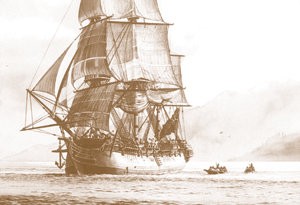We began this unit by discussing assumptions and differences that we carry into our class. In “First Contact as Spiritual Performance,” Lutz makes an assumption about his readers (Lutz, “First Contact” 32). He asks us to begin with the assumption that comprehending the performances of the Indigenous participants is “one of the most obvious difficulties.” He explains that this is so because “one must of necessity enter a world that is distant in time and alien in culture, attempting to perceive indigenous performance through their eyes as well as those of the Europeans.” Here, Lutz is assuming either that his readers belong to the European tradition, or he is assuming that it is more difficult for a European to understand Indigenous performances – than the other way around. What do you make of this reading? Am I being fair when I point to this assumption? If so, is Lutz being fair when he makes this assumption?

To answer this question I turn to an essay written by Daniel Clayton titled, “Captain Cook and the Spaces of Contact at ‘Nootka Sound’”. In the essay, writer Daniel Clayton, questions the validity of scientific exploration and the personal journals that depict first encounters with Native peoples. He feels that it is impossible to be certain of the truth and that we can only measure the degree of precision and authenticity of historical texts by comparing them with other documents from the same period. Clayton emphasizes the importance of what perspective the document is being written from and how cultural relations to power often play a role. He does so by comparing and contrasting different primary and secondary sources. Clayton explores the possibility of using a number of different sources to determine the truth the best we can.
He compares and contrasts the “official accounts”, edited by John Douglas, and Cook’s own journal of his third voyage. Cook himself wrote in a more objective manner and Douglas seemed to change Cook’s words and added a few of his own. Clayton notes the inconsistency between Douglas’s account and Cook’s original journal itself. Clayton not only looks at Cook’s personal journal but he also reflects on a number of accounts written by Cook’s crew. He also talks about the differences in the journals of many of the officers and crew from Cook’s ships. Their journals recorded things that were not in Cook’s journal and often their observations contradicted his. They also reflected more of how the Natives tell the story. They speak of the Native’s astonishment at seeing the ship approach their land.
He also explores the encounter from the viewpoint of the Native people. When looking at Native accounts of the same encounter it is very clear that the meeting was interpreted in very different ways. Most of these accounts spoke of their fear of the unknown object that was approaching their land. In both Cook’s journal and the official account this fear was not mentioned. It is very clear that the Native accounts give a whole new perspective on how the first encounters went. Although some of the details of the encounter were similar, it is clear they came from very different points of view. This makes me question if all of this is due to misunderstanding? Or is there a relation to power here?
Clayton states that this is due to the fact that the stories sent back to Europe needed to be of a positive nature while finding information about the land and people for colonization purposes. Cook had an image to uphold and the editing of his journal was done in a way to depict that image. Clayton emphasizes the importance of being aware of the different issues that are raised when looking at different accounts of one encounter. One cannot find the truth by just relying on one person’s recollections. It is also important to ask why some accounts are thought to be true while others are dismissed? And how this relates to power?
Scientific explorers from Europe came to the America’s with a set way of how to depict the land and indigenous people. They attempted to be objective but were not completely successful in doing so. Even though Cook did not pillage or colonize, how he told his story affected how Europeans saw the America’s. When reading historical work one must remember that it is one person’s account of what happened and it is from their perspective. These perspectives can vary drastically depending on ones upbringing or culture. When considering what is historically true it is important to take into consideration the different perspectives that are drawn from the same time. One must look at the relationship with power and how that power influences what we believe as true. By looking at different accounts of the first encounters you can begin to put the pieces together like a puzzle. Allowing one to get as close to the truth as possible or at least finding out what cannot be the truth. We often fall into the mindset of believing that because it was recorded it must be true but we often do not look at the other perspective or consider oral narratives.
Works Cited
Clayton, Daniel Wright. 2000. Islands of truth: The imperial fashioning of Vancouver Island. Vancouver: UBC Press.
“Historic Figures: Captain James Cook (1728-1779).” BBC. BBC, 2014. Web. 2 March 2016.
“Historic Nootka Sound.” Get West Adventure Cruises. 2010-2014. Web. 2 March 2016.
